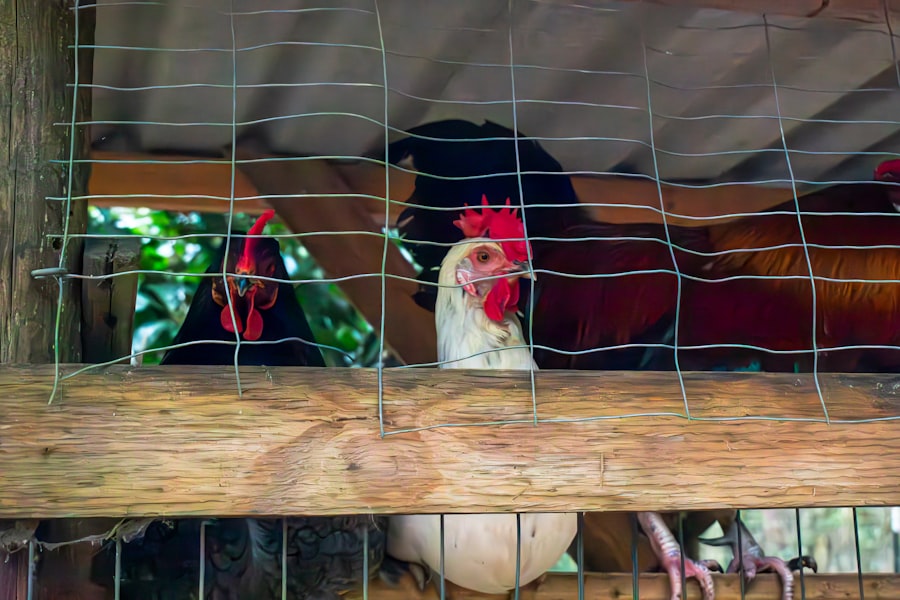A garden fence provides several advantages for both the garden and the property owner. Primarily, it serves as a protective barrier against pests and wildlife. The physical obstruction prevents animals such as rabbits and deer from accessing the garden and consuming cultivated plants and vegetables.
This protection can result in improved crop yields and a more successful gardening outcome. Additionally, a garden fence can significantly enhance the visual appeal of an outdoor space. The wide range of available fence styles and materials allows homeowners to select an option that harmonizes with their garden’s design and augments its aesthetic value.
From traditional picket fences to contemporary metal designs, a thoughtfully chosen fence can improve the overall appearance of a garden and contribute to a more refined and unified outdoor environment.
Table of Contents
- 1 Choosing the right type of fence for your garden
- 2 Installing a fence to keep chickens out
- 3 Maintaining your garden fence
- 4 Alternative methods for keeping chickens out of your garden
- 5 Tips for training chickens to stay out of the garden
- 6 Ensuring the safety and well-being of your chickens
- 7 FAQs
- 7.1 What is the purpose of a fence around a garden to keep chickens out?
- 7.2 What are the benefits of having a fence around a garden to keep chickens out?
- 7.3 What are the different types of fences that can be used to keep chickens out of a garden?
- 7.4 How high should a fence be to keep chickens out of a garden?
- 7.5 Are there any regulations or restrictions on building a fence around a garden to keep chickens out?
Key Takeaways
- A fence around your garden provides security and privacy, keeps out unwanted pests, and adds aesthetic appeal to your property.
- When choosing a fence for your garden, consider factors such as the purpose of the fence, the level of maintenance required, and the overall look you want to achieve.
- Installing a fence to keep chickens out involves selecting a suitable height and material, ensuring proper installation, and regularly inspecting and repairing any damage.
- Regular maintenance of your garden fence is essential to ensure its longevity and effectiveness, including cleaning, repainting, and repairing any damage.
- Alternative methods for keeping chickens out of your garden include using chicken wire, netting, or electric fencing, as well as creating physical barriers and using deterrents such as scare tactics or repellents.
Choosing the right type of fence for your garden
Purpose of the Fence
The primary purpose of the fence is a crucial consideration. If you’re looking to keep out small animals like rabbits and groundhogs, a shorter fence made of wire or mesh may be sufficient. However, if deer are a concern in your area, a taller fence made of wood or metal may be necessary to effectively deter them.
Style and Design
The aesthetic appeal of the fence should complement the overall look of your garden and outdoor space. For a more traditional or rustic garden, a wooden picket fence may be the perfect choice, while a sleek metal fence could be better suited for a modern garden design.
Durability and Maintenance
The durability and maintenance requirements of the fence should also be taken into account. Wood fences may require more maintenance over time, while metal or vinyl fences are often more low-maintenance options. Considering these factors will help you choose a fence that not only meets your practical needs but also enhances the beauty of your garden.
Installing a fence to keep chickens out

Chickens can be delightful pets and valuable contributors to a sustainable lifestyle, but they can also wreak havoc on a garden if left unchecked. Installing a fence specifically designed to keep chickens out is an effective solution to this problem. A chicken-proof fence should be at least 6 feet tall to prevent them from flying over it, and it should also extend underground to prevent them from digging underneath it.
When installing a chicken-proof fence, it’s important to use sturdy materials such as wire mesh or hardware cloth that can withstand the pecking and scratching of the birds. Additionally, make sure to secure the bottom of the fence to the ground to prevent any gaps that chickens could squeeze through. Proper installation is key to ensuring that your garden remains protected from the curious and hungry antics of your feathered friends.
Maintaining your garden fence
Once you have installed a fence around your garden, it’s important to properly maintain it to ensure its effectiveness and longevity. Regular maintenance tasks may include inspecting the fence for any damage or wear, cleaning the fence to remove dirt and debris, and treating any wooden components to prevent rot or decay. Inspecting the fence periodically allows you to identify any areas that may need repair or reinforcement.
This proactive approach can help prevent small issues from turning into larger problems that compromise the security of your garden. Additionally, cleaning the fence with a gentle detergent and water can help preserve its appearance and prevent the buildup of mold or mildew. For wooden fences, applying a protective sealant or stain can help prolong their lifespan by shielding them from moisture and UV damage.
This simple step can make a significant difference in the durability and appearance of your garden fence. By staying on top of maintenance tasks, you can ensure that your fence continues to provide the protection and visual appeal that it was designed for.
Alternative methods for keeping chickens out of your garden
In addition to installing a physical fence, there are alternative methods for keeping chickens out of your garden. One option is to use natural deterrents such as plants with strong scents or prickly textures that chickens find unappealing. For example, planting herbs like rosemary, lavender, or thyme around the perimeter of your garden can help deter chickens from venturing too close.
Another alternative method is to use visual deterrents such as scarecrows or reflective objects that move in the wind. These visual cues can startle chickens and discourage them from entering the garden area. Additionally, creating designated areas for chickens to roam and forage away from the garden can help redirect their attention and minimize their impact on your plants.
It’s important to note that while these alternative methods can be effective in some cases, they may not provide as reliable or comprehensive protection as a physical fence. However, incorporating multiple deterrents and strategies can help reinforce the barrier between your garden and your feathered companions.
Tips for training chickens to stay out of the garden

Positive Reinforcement: Rewarding Good Behavior
Training chickens to stay out of the garden requires patience and consistency, but it is possible with the right approach. One effective method is to use positive reinforcement by rewarding chickens when they stay away from the garden area. This can be done by providing treats or access to a separate foraging area when they exhibit desirable behavior.
Negative Reinforcement: Discouraging Unwanted Behavior
On the flip side, it’s important to discourage unwanted behavior by using negative reinforcement when chickens attempt to enter the garden. This can be achieved by making loud noises or using gentle deterrents like water sprays to create an unpleasant association with approaching the garden.
Consistency is Key
Consistency is key when training chickens, so it’s important for all members of the household to adhere to the same rules and reinforcement techniques. By establishing clear boundaries and consistently reinforcing them, you can help teach your chickens to respect the limits of their roaming area and minimize their impact on your garden.
Ensuring the safety and well-being of your chickens
While it’s important to protect your garden from chickens, it’s equally important to ensure the safety and well-being of your feathered friends. Providing chickens with a spacious and enriching living environment can help reduce their desire to explore areas they shouldn’t be in, such as your garden. Ensuring that chickens have access to fresh water, nutritious feed, and ample space for exercise and foraging can help satisfy their natural instincts and reduce their inclination to seek out alternative food sources in your garden.
Additionally, providing adequate shelter and protection from predators can help keep chickens safe and content in their designated areas. Regularly monitoring the health and behavior of your chickens can also help identify any issues that may be contributing to their interest in the garden. Addressing any underlying health or behavioral concerns can help create a harmonious coexistence between your chickens and your garden.
In conclusion, installing a well-chosen fence around your garden can provide numerous benefits, including protection from pests and animals, enhanced aesthetic appeal, and increased gardening success. When selecting a fence for your garden, consider factors such as its purpose, style, durability, and maintenance requirements to choose the best option for your needs. If you have chickens that pose a threat to your garden, installing a chicken-proof fence or using alternative deterrents can help keep them at bay.
Additionally, training chickens through positive and negative reinforcement techniques can help teach them to respect boundaries and minimize their impact on your garden while ensuring their safety and well-being. By taking these steps, you can create a harmonious balance between your garden and your feathered companions.
If you’re looking to keep chickens out of your garden, you may want to consider investing in a sturdy fence. According to a helpful article on Poultry Wizard, “Where to Put Chicken Coop,” having a secure fence around your garden can help prevent chickens from getting in and causing damage to your plants. To learn more about keeping chickens and the importance of a good coop, check out this article for some valuable tips and advice.
FAQs
What is the purpose of a fence around a garden to keep chickens out?
The purpose of a fence around a garden to keep chickens out is to protect the plants and vegetables from being damaged or eaten by the chickens. It also helps to maintain the aesthetics of the garden and prevent the chickens from creating a mess.
What are the benefits of having a fence around a garden to keep chickens out?
The benefits of having a fence around a garden to keep chickens out include protecting the plants and vegetables, maintaining the cleanliness of the garden, and preventing the chickens from spreading pests or diseases.
What are the different types of fences that can be used to keep chickens out of a garden?
Some common types of fences that can be used to keep chickens out of a garden include wire mesh fences, electric fences, wooden fences, and netting. The choice of fence will depend on the specific needs and preferences of the garden owner.
How high should a fence be to keep chickens out of a garden?
The height of the fence needed to keep chickens out of a garden will depend on the breed and size of the chickens. In general, a fence should be at least 6 feet high to effectively keep most chicken breeds out of the garden.
Are there any regulations or restrictions on building a fence around a garden to keep chickens out?
Regulations and restrictions on building a fence around a garden to keep chickens out may vary depending on the location and local ordinances. It is important to check with local authorities or homeowner associations to ensure compliance with any relevant regulations.
Meet Walter, the feathered-friend fanatic of Florida! Nestled in the sunshine state, Walter struts through life with his feathered companions, clucking his way to happiness. With a coop that’s fancier than a five-star hotel, he’s the Don Juan of the chicken world. When he’s not teaching his hens to do the cha-cha, you’ll find him in a heated debate with his prized rooster, Sir Clucks-a-Lot. Walter’s poultry passion is no yolk; he’s the sunny-side-up guy you never knew you needed in your flock of friends!







